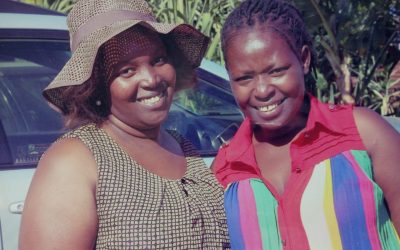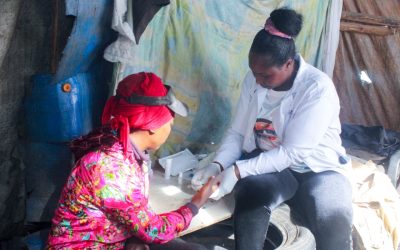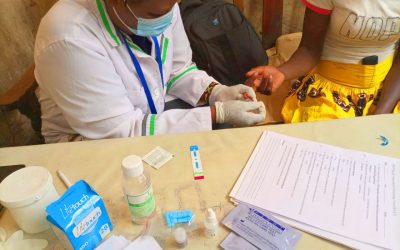6th April 2021…Daisy Kwala is an adherence counselor with Bar Hostess and Support Programme (BHESP). Her normal day in the office will see her attend to tens of sex workers some of whom are HIV positive and on ARVs. She says for the last few weeks, ARVs supply has been on a steady decline. “Though we have some stock left, we are worried that if the drugs are not released and distributed we are going to have a serious shortage in the coming days. The patients have had to do with reduced doses” said Ms. Kwala. “People living with HIV will not be able to keep their viral load suppressed and with unsuppressed viral loads, the rate of transmission will be very high, with many new HIV infections thus increase in HIV prevalence in the country” she added.
Mary Nafula (not her real name) has been living with HIV for over a decade now. She is a sex worker operating in Kariobangi informal settlement. Mary also makes ornaments from locally available materials to complement her earnings. She fetches her ARVs from BHESP clinic in the Roysambu area in Nairobi and uses about Ksh 300 for her bus fare. For the times that she has been visiting the clinic, she collects drugs that will push her for about 4 months but that has not been the case the last 3 times she has visited the clinic. She was given a reduced dosage that will only last for 2 weeks, meaning she has to make several visits to the facility, eating on to her time and limited resources.
A tweet by one Doreen Moraa Moracha, a young woman living with HIV in Kenya, has raised alarm over the shortage of antiretrovirals (ARVs) in the country, drugs that are key in the fight against the virus.
There is a shortage of ARVs in Kenya ???people on the DTG regimen are now being given 1 month or 2 weeks dosage such scenarios make me hopeless because how can we fight HIV without ARVs? How are we going from 6 months dispensing of ARVs to 2 weeks?????— Doreen Moraa Moracha (@D_Moraa) March 23, 2021
In what points to devastating consequences due to the limited supply of the drugs, Moraa, who has been leading HIV/AIDs awareness campaigns for some time now, made it clear on her March 23rd tweet that people on the dolutegravir (DTG) drug are now being given one month or two weeks’ dosage from the previous six months dispensing.
“Such scenarios make me hopeless because how can we fight HIV without ARVs? How are we going from 6 months dispensing of ARVs to 2 weeks?” she posed.
Based on new evidence assessing benefits and risks, the World Health Organization (WHO) recommends the use of DTG as the preferred first-line and second-line treatment for all populations, including pregnant women and those of childbearing potential.
The 28-year-old Doreen, who was born with HIV, is among the few people in the country who have openly declared their HIV/AIDs status and are creating awareness through social media and other forums to fight HIV-related stigma.
Her remarks come months after the Joint United Nations Programme on HIV/AIDS (UNAIDS) warned of potential HIV drug shortages due to higher costs linked to lockdowns and COVID-19 border closures.
In a report released in July 2020, the agency urged the world and manufacturers to take pre-emptive action saying the production of generic antiretroviral drugs and their distribution were threatened.
The agency warned that the crisis would put millions of people at risk particularly in developing countries if they go without treatment, both to themselves and others from an increased chance of HIV transmission.
“It is vital that countries urgently make plans now to mitigate the possibility and impacts of higher costs and reduced availability of antiretroviral medicines,” said Winnie Byanyima, Executive Director of UNAIDS.
“I call on countries and buyers of HIV medicines to act swiftly in order to ensure that everyone who is currently on treatment continues to be on it, saving lives and stopping new HIV infections.”
Some of the factors linked to the shortage include increased manufacturing and transport costs, the need to find new sources of key pharmaceutical ingredients, and currency fluctuations caused by the economic shock of COVID-19.
UNAIDS said that a 10–25 percent increase in these costs could make the final cost of exported antiretroviral medicines from India alone between $100 and $225 million a year more expensive than before.
Kenya has the joint third-largest HIV epidemic in the world (alongside Tanzania) with 1.6 million people living with HIV in 2018. Out of the population, 1.2 million are said to be on ARVs.
As of 2018, 69 percent of adults living with HIV in Kenya were accessing treatment. However, treatment coverage among children aged under 15 was lower, at 61 percent.
But there is hope for Mary, Doreen, and the millions of Kenyans living with HIV as the government has approved tax exemption on anti-retroviral drugs donated by the USAID, which arrived in Kenya on January 18 2021.
The approval follows a request by the ministry of health to the treasury on account that at least 1.6 million Kenyans living with HIV depend on the drugs to boost their immunity.






